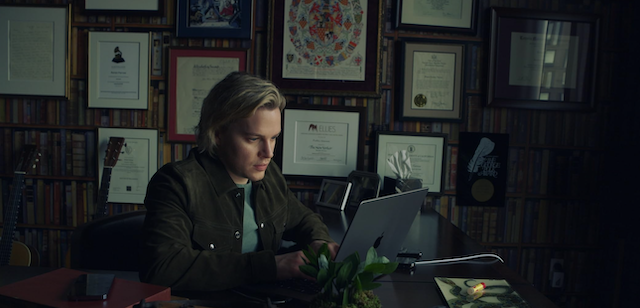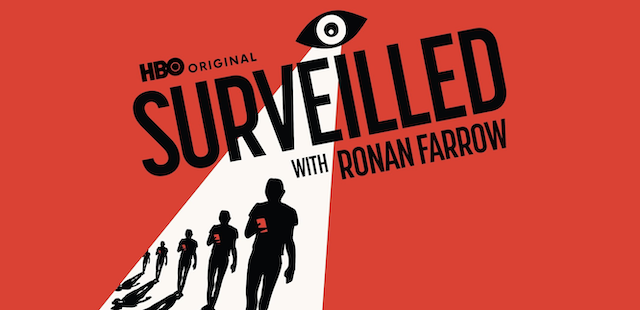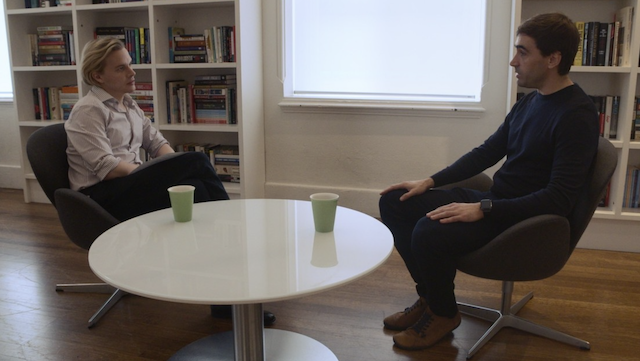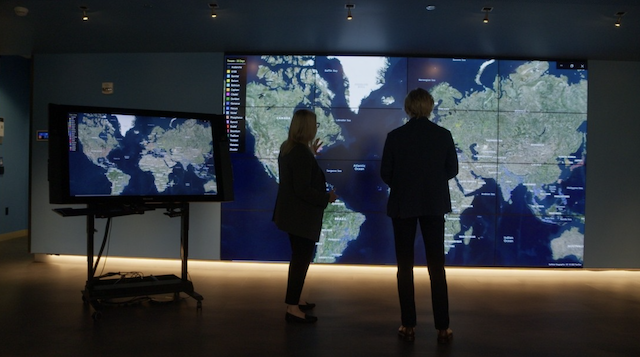

©Courtesy of HBO
Exclusive Interview with Co-Director Matthew O’Neill
Q : Ever since the Edward Snowden incident, people are keenly aware monitorization of the government, and what’s going on in our current society. But I’m curious to know what’s your relationship to Ronan Farrow to investigate the NSO group and their spyware Pegasus? Talk about the relationship with Ronan and how this project started?
Matthew O’Neill : Perri Peltz and I. Perri is the director along with me of Surveilled, which is out on HBO. We met Ronan through our long time collaborators and supervisors at HBO Lisa Heller and Nancy Abraham, two leaders of the HBO Documentary Unit.
Perri and I have been making documentaries for HBO for many years, most recently before this, the Axios on HBO series with the news organization Axios, and work at that intersection of documentary storytelling and journalism. Lisa and Nancy thought Ronan, Perri and I would work well together and introduced us.
Ronan talked about his ideas about the potential for a film and the investigation work that he was doing into Pegasus software. And from those conversations, Surveilled. And the idea was to the reporting process to give the audience the opportunity to sort of ride shotgun with Ronan as he drove through this incredible investigation into spyware, cyber surveillance, and its use and abuse around the world.
You get to be with Ronan as he travels from New York to Israel, to Spain, to Washington, D. C., meeting with, talking to, holding the people who are creating this spyware, who are managing this spyware, who are regulating this spyware to account.
Q : Ronan Farrow has a very old school private investigation in a certain sense, he was obviously famous for the Weinstein investigation. At the same time, it’s very cinematic about his approach in a certain extent, so talk about what element surprised you most about Ronan’s approach on the investigation that you don’t know about?
Matthew O’Neill: I think Ronan is one of the great investigative journalists working today. It takes tenacity and relentlessness that you get to see in the film. Because it is difficult to have the door slam in your face as you’re trying to understand the way things are being created. The nature of spyware in its essence, is not transparent.
The people operating in intelligence are not usually interested in having journalists or scrutiny or transparency into the way in which they operate. And I don’t know it was surprising, but it was really interesting to see up close the work that Ronan’s doing, the journalism work.
And that’s what we try to do in the film as well, so if you’re watching, you get to be in the room as Ronan is discovering new threads in his storytelling, new possibilities as he’s discussing things with whistleblowers with government leaders. It’s an opportunity to see how journalism is done, as you learn about the topic, and also go to some of the incredible places where the use and abuse critically, the abuse of spyware and surveillance software is affecting real people.
Q : I was really surprised that the NSO group invited Ronan Farrow to interview some of the workers from the NSO Group. As you compare to the other spyware companies, I don’t think they’re gonna grant any interviews. But what do you think is the reason that they allow you guys to interview? Because they want to show some clearance from their company. What’s your impression of the people who work there? They’re obviously insisting on not hurting any of the innocent people. They are just investigating criminals and the terrorists through this spyware. So what’s your impression of them?
Matthew O’Neill : I believe there are individuals in the law enforcement community, individuals at NSO group, individuals who create similar spyware, who believe that it has potential for good. And are sincere in those beliefs. And there are many many law enforcement agents who are looking for whatever tools they can to solve their investigations.
Now, the difficulty with this particular type of investigatory product is that it is so overwhelming in what it can gather. It’s like the nuclear bomb of intelligence gathering when it comes to privacy, because it’s not as elegant and simplistic as tapping a phone line to look at that communication.
If you tap your phone, they can have everything. Your photos, your bank account information, your text messages, your geolocation, put together your patterns of conversations, and also by extension as you see in the film, it’s not just you, it’s everyone who communicates with you who is also vulnerable.

©Courtesy of HBO
Q : Oh, I see. And they also can manipulate the software in the cellphone to record something, right? Like a microphone and video content to record voices while you’re talking. So that’s really dangerous. But the CEO of the NSO Group, his stance is that basically everybody creates spyware and that’s the reality. Are there any companies that are competing against Pegasus, right now? Or do you know anything besides Pegasus that we need to be concerned about?
Matthew O’Neill : There are private companies in the spyware space that are all over the world. It’s been tracked and reported about companies in Macedonia, in Cyprus, in India. These are commercial companies selling spyware to government entities. There also are government agencies that are developing their own tools for surveillance. And we don’t know that no one from the U.S government opted to share with us what spying tools are being developed at the NSA or the CIA, and Russia and China are widely suspected to have Pegasus-like software. It’s hard to say direct competitors, but I think it can be said that this type of cyber spyware and the potential for this level of intrusive surveillance exists.
It’s here, it’s in the hands of certain governments and agencies for sure. It is sold by certain private contractors for sure. And as is the nature of all technology, it is only going to proliferate and become more common. As time goes on, that cat and mouse game between the people who are creating spyware, whether they’re private companies or government agencies, and the people who are defending our privacy from spyware is just going to continue and the stakes are only going to get higher.
Q : I’m curious to know on the surface that the Biden administration placed this company on a trade blacklist. But do you think the U.S. also bought this spyware in order to prevent it from attacking the government, you have to know the software, right?
Matthew O’Neill : So it’s been reported that the FBI Had a contract with NSO group for Pegasus spyware towards the end of the Trump administration and the FBI says that contract was for research purposes to understand. The spyware is not for operational use, not to be deployed in the United States on people’s phones. That contract was canceled at the beginning of the Biden administration.
As you pointed out, the NSO group is on a U.S blacklist in terms of being able to do business with the U.S government. That said, as you hear from representative Hines, in the film, the people in government see this as a tool and don’t want to fall behind other users of similar tools.
So that’s where that tension lies is that there are good people who want to use this technology for good. And there are people who want to manipulate its use and use it in ways that take away our privacy and take away our civil rights. The system of checks and balances on the use of this spyware is really important.
Just like tapping a phone is a tool that law enforcement can use to investigate real criminals with a warrant approved by a judge with a certain degree of transparency. There may be a place for some of these tools because they exist. And law enforcement, I think in many cases has a desire to use these tools for righteousness and just causes.
It’s just that the potential for abuse is so high. We need to have scrutiny and transparency in how the government is using these tools and also put pressure that these tools don’t proliferate, so that they don’t wind up being in the hands of bad terrorists, criminals, or jealous spouses.
Q : Could you take us through the current state of Israeli surveillance innovation? There’s a pipeline to expertise, military and intelligence. Could you talk about the pipeline and the current state of Israel’s surveillance innovation out there?
Matthew O’Neill : The cutting edge of surveillance technology is always difficult to report on because it’s not something that many people are talking about. Even I believe that the NSO group would like to talk about success cases. But they don’t, as a policy, talk about the details of any case.
So what is actually occurring today is I don’t know. That reporting is not up to the date. What I can infer is that whether it’s private companies in Israel or private companies in other parts of the world or government agencies is that there have been innovations in spyware and surveillance that have pushed this technology forward since the world began to know about Pegasus.

©Courtesy of HBO
Q : I just want to get into this conversation because it’s really important, because this spyware could be waged over the war, but in order to infect your phone with this spyware, it has to go through apps that Silicon Valley companies created, I’m curious to know what’s the take Silicon Valley company’s standpoint on this spyware, how they try to prevent those things to happen?
Matthew O’Neill : So I think that the customer base for Silicon Valley. Whether we’re talking about the Apple operating system or the chrome operating system or WhatsApp, these are all products that people will either want to use or not want to use. And the success of these companies relies on people wanting to use their products.
And that’s where our responsibility is, our consumers come in terms of advocating for what we want in privacy. Because if we are saying we want to be protected, we need you to innovate to protect our phones and our private data from companies like spyware, like Pegasus and other spyware, it would be it from government agencies or private companies.
If we have that pressure, which I think it’s very real, on the people creating this technology, they will continue to innovate and change and give software updates that protect us. But it is a constant battle and that pressure needs to be on from the consumer, always both towards Silicon Valley but also towards the women and men who represent us in Congress at a federal level and regulate technology at large in the United States and around the globe.
Because without individuals advocating for privacy and protection from these cyber surveillance tools, they will proliferate, and every phone will be a spy in our pocket.
Q : That’s true. You guys happened to talk to a former worker of NSO group who basically could be like a whistleblower that demonstrates actually selling the Pegasus and also revealing the price tags on those actual spywares. And this whistleblower is really concerned about the future. As well as his colleague who left the company. Are there more people you guys ended up interviewing besides this guy who left the company?
Matthew O’Neill : In pursuing a story like this where there are so many sensitivities around intelligence gathering spyware technology and its use and abuse. There’s lots of people to talk to, some people talk on the record like the former employee that you’re referring to that’s in the film with their identity disguised, but on record.
Other people talk off the record. Other people talk in the background. And I think within respecting those sorts of agreements, because if someone agrees to speak in the background, that’s it. We don’t have reference who they are or what they said specifically, but inform our editorial decision making. And it’s there to say that between Ronan, Perri and I and our production team, we spoke with people across private industry, civil society, and government who are intimately involved in these issues and ideas, and those conversations on the record or off the record inform every moment.
Q : During this investigative approach, what are the things you learn about the Pegasus and NSO group, and what’s your opinion on moving forward?
Matthew O’Neill : I think one thing that I didn’t know at the beginning of this process that is useful for anyone who’s listening or watching is that rebooting your phone is a good way to protect yourself.
And I never rebooted my phone. Now I reboot my phone religiously, every morning to make sure it is up to date and any spyware like Pegasus or Run of the mill spyware that maybe I did click on a link I shouldn’t have that have somehow made it onto my phone gets cleared out with that reboot.
Because rebooting is a very good way to give yourself some level of protection. Nothing we do can be totally protective, but rebooting your phone is good daily digital maintenance. And there are certain private companies that are saying that they have products that can crack tools like Signal, which is something that we use to communicate privately, encrypted communication software. The more encryption you can use and the more sophisticated software you can use to make sure that your conversations and ideas are not being monitored the better off you are.

©Courtesy of HBO
If you like the interview, share your thoughts below!
Check out more of Nobuhiro’s articles.
Here’s the trailer of the film.

